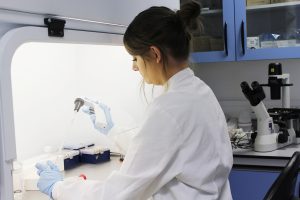Role description: Demonstrating work takes place in the teaching laboratories of the Medical School (A-D) or any other School that you have chosen to register as a demonstrator. The duty of a demonstrator is to help undergraduate students during their laboratory practicals and make sure they follow the health and safety rules during the practical. Sometimes, they may be asked to demonstrate a particular technique, as well.
Training: An e-mail is sent around all postgraduate research students at the beginning of the academic year. Students are asked to complete a form to express their interest in demonstrating and identify some key areas of their research interest.
 Each School provides their own training for demonstrators. Training sessions are organised (generally twice per year, but it may vary across different Schools) which are communicated to the potential demonstrators. Students then sign up for the training session of each particular school, which needs to be completed once for the duration of their studies (i.e. if you express your interest for demonstrating during your first year and wish to demonstrate during your second year, you do not need to have another training session as long as you have attended one previously). You cannot be assigned demonstrating duties, unless you have the training. Some restrictions may apply for final year PhD students, so it is worth checking with the School whether you are eligible to sign up.
Each School provides their own training for demonstrators. Training sessions are organised (generally twice per year, but it may vary across different Schools) which are communicated to the potential demonstrators. Students then sign up for the training session of each particular school, which needs to be completed once for the duration of their studies (i.e. if you express your interest for demonstrating during your first year and wish to demonstrate during your second year, you do not need to have another training session as long as you have attended one previously). You cannot be assigned demonstrating duties, unless you have the training. Some restrictions may apply for final year PhD students, so it is worth checking with the School whether you are eligible to sign up.
Please note that if you wish to demonstrate for different Schools (eg, School of Biomedical Sciences, School of Biology etc), you would need to attend the demonstrator’s training session in each School separately. This is mainly because each School runs different practicals, which might require different skills. The basics of demonstrating work remain the same though.
Only after completing the training, are students added in the mailing list for demonstrating and receive work opportunities via e-mail.
Academic development: Recently, training sessions about demonstrating were added to the development programme as part of the Learning and Teaching Development Service – ILTHE workshop. The sessions can be found in the online booking system (https://workshops.ncl.ac.uk, Figure 1). It is recommended that all students interested in their academic development and/or a potential teaching career attend these workshops. Information about the workshops are provided via e-mail after booking online each session. Students are required to complete online material on Blackboard as preparation for the one-day workshop that they have booked.

Figure 1: Example of ILTHE sessions for demonstrator and seminar leader in the workshop online system
Key duties: As previously mentioned, the demonstrator is responsible to help the students go through the practical, answer their questions and ensure the health and safety rules are followed by the students. They might be asked to mark their pre-work at the beginning of the practical and give feedback. The answers are normally provided beforehand via e-mail or during the briefing session. The practical leader is responsible to arrange the briefing session before the practical. The briefing session is organised to help the demonstrators get a better idea about the practical and prepare accordingly. During the practical each demonstrator is often responsible for around 20 students. At the end of the practical and having previously been informed, the students may be asked to undertake marking duties (either on Blackboard or on scripts collected from the Teaching office). A pre-marking session is often arranged and marking criteria are provided.
Payment: The payment rate for demonstrating is currently £14.22/hour. This is subject to change each year, but the difference is minor. Some Schools require a contract to be signed, which mainly outlines that demonstrators are not formal employees of the University and do not have any other benefits other than the agreed payment rate. Payment is processed through timesheets. The module or practical leader signs the timesheet at the end of the practical(s) and the students have to submit the timesheet in the teaching office before the 6th of each month to get paid at the end of the month. If the timesheet is not submitted by the 6th, payment will be received at the end of the following month.
